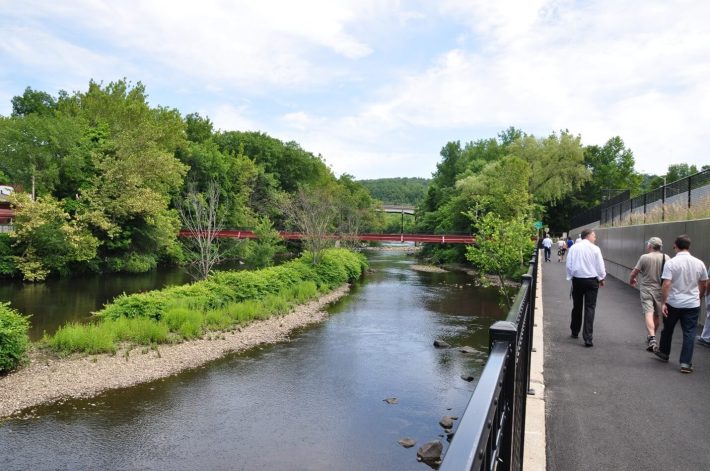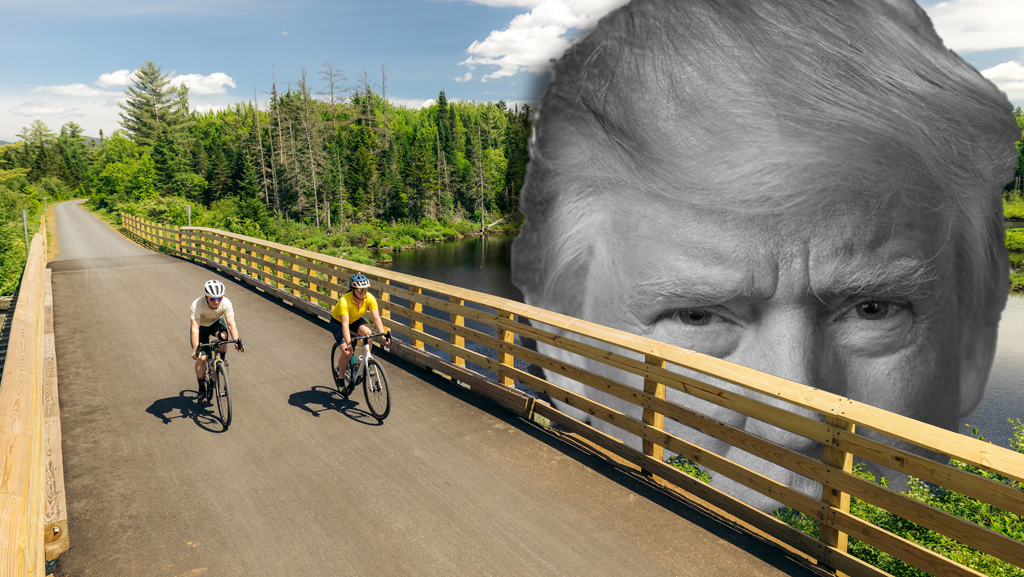When Rick Dunne got the news earlier this month that his federal transportation grant was cancelled, it felt like a punch to the gut.
Just a month before, he and his colleagues at the Naugatuck Valley Council of Governments had been finalizing a draft agreement with the Federal Highway Administration to secure the funds they need to design the last 16 miles of the Naugatuck River Greenway, a visionary and long-sought trail that would stitch together a string of 11 towns in western Connecticut and finally give residents a way to travel between them safely without cars.
For Dunne, it was also something of a personal quest. In 1996, early in his career, he'd written the very first federal grant application that helped create the initial, disconnected segments of that trail, which soon collectively became the Nutmeg State's most-popular greenway even in its fragmented, incomplete state. He'd also watched cities clamber for decades to see their segments of the path completed next — especially after a 2017 report found that residents closest to it enjoyed almost $14 million in benefits from avoided driving trips, not to mention avoided healthcare costs, increased economic activity, and other benefits.

Now, decades later and serving as the executive director of the regional MPO, Dunne had looked forward to seeing the vision for the greenway finally complete: a glorious 44-mile, almost entirely off-road trail where Nutmeggers could bike or fish or walk from downtown to downtown to get to work, all while finally restoring access to a river that had been shut off to them for decades while polluting factories dominated its shores.
In June 2024, late in the Biden administration, the project won a $5.7-million RAISE grant for final design work. And even after the White House changed hands and the RAISE program was renamed BUILD, everything still seemed to be on track — especially as other grants they applied for at the same time sailed through without issue.
On Sept. 9, though, Dunne received a letter stating that his design grant was cancelled — and with it, another $10 million-plus in state, regional, and local funds to actually build the trail segments. He did not even receive a phone call or an opportunity to discuss the devastating news, nevermind amend his application to address the new administration's concerns keep the money flowing.
And the reason the DOT gave in that letter was shocking, too: because the department was "focusing ... multimodal grant programs primarily on projects that promote vehicular travel [and] ensuring that taxpayer dollars are used efficiently in ways that maximally benefit the American people and their quality of life."
"I wasn't expecting this; I thought it was fine," said Dunne. "But apparently, what happened is that when the contract got to headquarters, it just got axed."
He wasn't the only one who was devastated.
“The Trump administration’s cancellation of funds for the Naugatuck River Greenway Trail is arbitrary and asinine," Sen. Richard Blumenthal (D-Conn.) said in a statement to Streetsblog. "Naugatuck Valley communities have already invested significant funds and dedicated serious resources to this project. Multimodal trails have been a huge success in Connecticut — bolstering economic development and creating pathways for bicyclists and pedestrians to travel safely. I strongly urge the Department of Transportation to reverse this dumb decision and release the funds as soon as possible.”
'A direct assault on the safety of Americans'
The Naugatuck Valley wasn't the only community that received a surprise from the feds earlier this month.
Communities as varied as Boston, Albuquerque, and McClean County, Illinois all received similar notices about their trail grants. Transportation for America's Corrigan Salerno estimated that "there are roughly 200 projects that may not be approved by the Trump administration," but "grant recipients can be hesitant to come forward with news on cancellations publicly, out of fear of future reprisal."
All of the grants that were confirmed to be cancelled were from the BUILD program — formerly called RAISE, and TIGER before that — which for more than 15 years has been one of the most popular pots of multimodal money that the federal government provides.
That's because, contrary to the letter that Naugatuck received, Congress has recognized for more than a decade that money for bike and walk trails does "maximally benefit the American people and their quality of life." And trails also save lives, especially since roughly 30 percent of Americans don't or can't drive at all, and more than 20 pedestrians are killed by drivers on car-dominated U.S. roads every single day.
"Cancelling active transportation projects is a direct assault on the safety of Americans — in every town and every city in the country," said Scott Goldstein, senior director of government relations at the Rails to Trails Conservancy. "The hostility, scale and reach of this clawback is unlike anything we have seen."
"Communities chose these projects, and the department is putting its judgment ahead of theirs, while showing a blatant disregard for the safety of families walking in their neighborhoods, children getting to school, and everyone who relies on active transportation to navigate the places where they live and work," Goldstein continued.
Especially in places like the Naugatuck Valley, where many communities have under 5,000 residents, a completed trail can also be a critical driver of tourism and an accelerant to local economies, as well as a powerful way to confront the harmful impacts of excess car travel — something the state of Connecticut formally pledged to do when it set its goal to reduce vehicle miles traveled five percent per person by the end of the decade.
"Maybe there's a misconception that these are just recreational trails, that they're paths in the woods to nowhere, but that's not the case," added Dunne. "These are real commuter options that get people between places and get vehicles off the road, so we spend less money on maintenance and chasing volume on highways. We're trying to reduce VMT; that's a goal [I thought we] all share, at all levels of government. And that's why [this decision] is so perplexing and confusing."
'We just need to know the rules'
In many ways, Dunne says that the way Naugatuck's grant was cancelled — with no warning, no opportunity to appeal, and no acknowledgment of the chaos that an eleventh-hour funding clawback causes — is as alarming as the cancellation itself, as is administration's open acknowledgement that they made the move explicitly "to promote driving."
And some experts say both moves represent the Trump administration's unprecedented shift away from implied distaste and procedural delays for multimodal projects, and towards a full-on attack on the multimodal transportation efforts American cities need most.
Prior to these notices, many advocates have expressed hope that the new White House would give Biden-era grantees an opportunity to reshape their projects to fit the new administration's priorities, instead of simply cancelling them outright. Many thought trails, in particular, were better positioned to withstand federal clawbacks, because they don't subtract much if any road space from drivers and often are built on under-used corridors like defunct rail lines and post-industrial river shores. (Dunne estimates that 95 percent of his greenway is entirely off-road.)
Dunne had that same impression about his grant — until everything changed.
"The draft agreement was finalized with FHWA about a month ago. ... We heard nothing further about RAISE from US DOT – no outreach, no follow up and no expression of concern," he told Streetsblog. "They did not attempt to conduct any negotiations to alter or amend the scope of the grant agreement to bring it in line with administration policy. Even given the current policies of the administration, I had the clear impression that there was no problem with this award."
Now, the Naugatuck Valley is in a difficult position. Without the promise of design money soon, officials will have to sacrifice $8.5 million in construction funds and $1.535 million in local matches that were earmarked for the project. That means the money will be reassigned to other uses — like highways.
To keep the trail project going, officials will have to revert to designing and and building it in small segments rather than all at once, creating massive inefficiencies and new costs as each chunk of trail undergoes a new, separate environmental review — an ironic twist, given the Trump administration's insistence on the importance of "streamlining" the environmental review process. And then there's the sunk costs of all the money, time, and passion that's been poured into securing the grant that they've now lost, not to mention all the lives that will be lost to car crashes and pollution while things wait to get back on track.
And since that pain will be multiplied out across potentially hundreds of communities all over America, some fear the Trump administration is setting the country up for a crisis.
"The policy that they've enunciated, it really doesn't make sense to us who do this at the ground level," said Dunne. "We're an MPO; we're mode-agnostic. We do highways, we do rail, we do buses, we do everything. ... We just need to understand the rules so we know what we're applying for, and what projects we can do."
For now, leaders like Rick Dunne are just scrambling to keep their projects alive — while advocates like Goldstein are urging Americans who care about active modes to take action.
"Grantees should not accept these cancellations at face value; now is the time to fight back," wrote Goldstein. "Get loud on Capitol Hill, so that your lawmakers understand the significance of this sweeping US DOT action. Show up at project sites and peacefully protest to make visible the loss of investment in our communities. Make sure mayors, county leaders and governors understand what is happening and demand that they urgently push to reinstate these funds — then work for better and bigger dedicated active transportation programs in the reauthorization."






